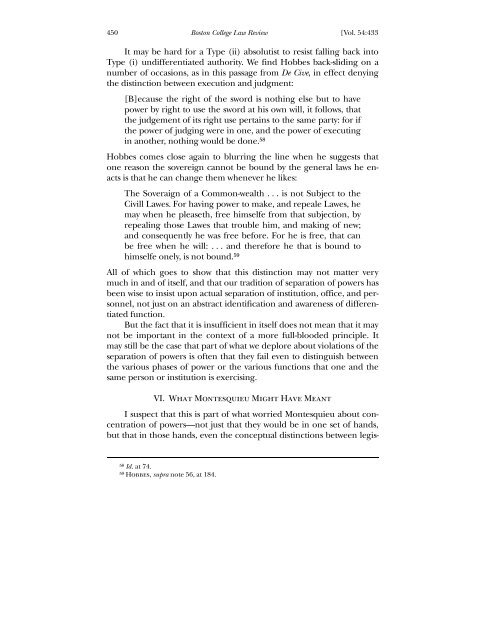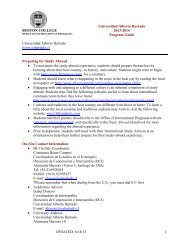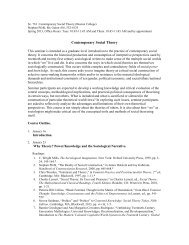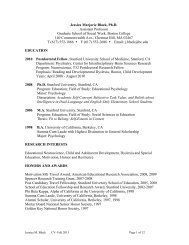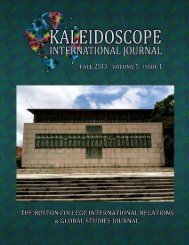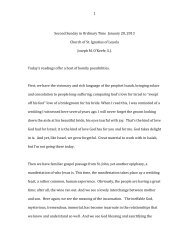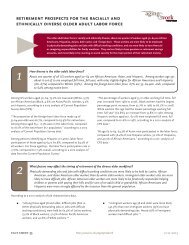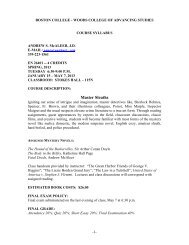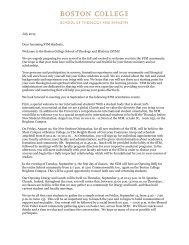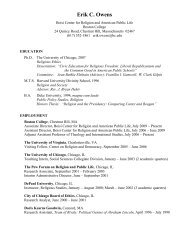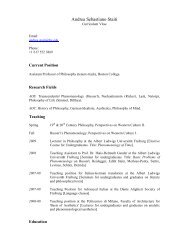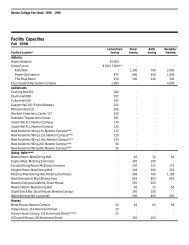separation of powers in thought and practice? - Boston College
separation of powers in thought and practice? - Boston College
separation of powers in thought and practice? - Boston College
You also want an ePaper? Increase the reach of your titles
YUMPU automatically turns print PDFs into web optimized ePapers that Google loves.
450 <strong>Boston</strong> <strong>College</strong> Law Review [Vol. 54:433<br />
It may be hard for a Type (ii) absolutist to resist fall<strong>in</strong>g back <strong>in</strong>to<br />
Type (i) undifferentiated authority. We f<strong>in</strong>d Hobbes back-slid<strong>in</strong>g on a<br />
number <strong>of</strong> occasions, as <strong>in</strong> this passage from De Cive, <strong>in</strong> effect deny<strong>in</strong>g<br />
the dist<strong>in</strong>ction between execution <strong>and</strong> judgment:<br />
[B]ecause the right <strong>of</strong> the sword is noth<strong>in</strong>g else but to have<br />
power by right to use the sword at his own will, it follows, that<br />
the judgement <strong>of</strong> its right use perta<strong>in</strong>s to the same party: for if<br />
the power <strong>of</strong> judg<strong>in</strong>g were <strong>in</strong> one, <strong>and</strong> the power <strong>of</strong> execut<strong>in</strong>g<br />
<strong>in</strong> another, noth<strong>in</strong>g would be done.58<br />
Hobbes comes close aga<strong>in</strong> to blurr<strong>in</strong>g the l<strong>in</strong>e when he suggests that<br />
one reason the sovereign cannot be bound by the general laws he enacts<br />
is that he can change them whenever he likes:<br />
The Soveraign <strong>of</strong> a Common-wealth . . . is not Subject to the<br />
Civill Lawes. For hav<strong>in</strong>g power to make, <strong>and</strong> repeale Lawes, he<br />
may when he pleaseth, free himselfe from that subjection, by<br />
repeal<strong>in</strong>g those Lawes that trouble him, <strong>and</strong> mak<strong>in</strong>g <strong>of</strong> new;<br />
<strong>and</strong> consequently he was free before. For he is free, that can<br />
be free when he will: . . . <strong>and</strong> therefore he that is bound to<br />
himselfe onely, is not bound.59<br />
All <strong>of</strong> which goes to show that this dist<strong>in</strong>ction may not matter very<br />
much <strong>in</strong> <strong>and</strong> <strong>of</strong> itself, <strong>and</strong> that our tradition <strong>of</strong> <strong>separation</strong> <strong>of</strong> <strong>powers</strong> has<br />
been wise to <strong>in</strong>sist upon actual <strong>separation</strong> <strong>of</strong> <strong>in</strong>stitution, <strong>of</strong>fice, <strong>and</strong> personnel,<br />
not just on an abstract identification <strong>and</strong> awareness <strong>of</strong> differentiated<br />
function.<br />
But the fact that it is <strong>in</strong>sufficient <strong>in</strong> itself does not mean that it may<br />
not be important <strong>in</strong> the context <strong>of</strong> a more full-blooded pr<strong>in</strong>ciple. It<br />
may still be the case that part <strong>of</strong> what we deplore about violations <strong>of</strong> the<br />
<strong>separation</strong> <strong>of</strong> <strong>powers</strong> is <strong>of</strong>ten that they fail even to dist<strong>in</strong>guish between<br />
the various phases <strong>of</strong> power or the various functions that one <strong>and</strong> the<br />
same person or <strong>in</strong>stitution is exercis<strong>in</strong>g.<br />
VI. What Montesquieu Might Have Meant<br />
I suspect that this is part <strong>of</strong> what worried Montesquieu about concentration<br />
<strong>of</strong> <strong>powers</strong>—not just that they would be <strong>in</strong> one set <strong>of</strong> h<strong>and</strong>s,<br />
but that <strong>in</strong> those h<strong>and</strong>s, even the conceptual dist<strong>in</strong>ctions between legis-<br />
58 Id. at 74.<br />
59 Hobbes, supra note 56, at 184.


